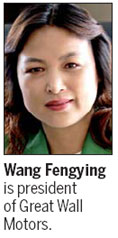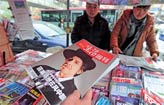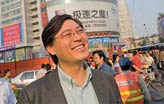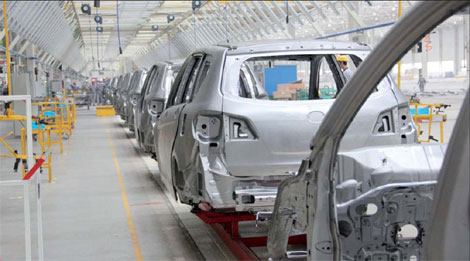Great Wall picks up overseas revenue
Updated: 2011-09-16 08:53
By Wang Chao (China Daily)
|
Great Wall Motors, based in Hebei province, sent 31,168 vehicles overseas in this year's second quarter, compared to 55,000 in all of 2010. Provided to China Daily |
China's top exporter of trucks, SUVs looks to new markets to develop a bigger clientele base
Amid the bombings and fires of the Libyan rebellion, Great Wall pickup trucks can be seen roaming through the scenes of the nightly TV news broadcasts.
Great Wall Motors is one of the biggest makers of sport utility vehicles (SUV) and pickups in China. The pickups in Libya are just a reflection of Great Wall's growing presence in overseas markets.
As a private enterprise in Baoding, North China's Hebei province, Great Wall Motors has made a splash overseas since the mid-1990s.
Great Wall began exporting vehicles to the Middle East in 1998, and quickly expanded to other regions. It has remained the top pickup exporter in China for 13 years, and became the top SUV exporter in 2003.
In 2010, the company shipped 55,000 vehicles overseas, mostly pickups and SUVs, worth 3 billion yuan ($470 million), up by 67 percent year-on-year.

Shang Yugui, vice-president and spokesman for Great Wall, says the Libyan government ordered 3,300 Great Wall pickups in 2009. Shang says the warfare has hurt some of Great Wall's business, so the company is trying to achieve better results in other regions.
According to the financial results for its second quarter ending Aug 19, Great Wall shipped 31,168 vehicles to 120 countries, mostly in Asia, the Middle East, Africa and eastern Europe.
The overseas market contributes 20 percent to its total revenue, according to the company. The proportion is expected to reach 30 percent by 2015.
Since Great Wall is exporting to more than 100 countries, it has to revise its products in line with different requirements, Shang says.
It installs powerful radiators on vehicles sold to the Middle East, where temperatures can easily reach 50 C; while in Russia, the company has to make anti-freeze engines and revise the whole power system to survive freezing weather.
"We are like the chefs, making dishes based on different customers' tastes," says Wang Fengying, president of Great Wall Motors.
The strategy is proving very lucrative for Great Wall, and the brand's popularity is growing.
"We can earn higher profit margin in overseas markets than in domestic ones," she says. "In overseas markets, we are able to ask for a higher price, and we are able to persuade customers to pay that price."
Wang says the SUV Haval H5 sells for $22,000 to $24,000 in Russia, which is equivalent to the Hyundai Tucson. The same SUV costs $14,000 to $24,000 in China.
"The price is higher than in China, because consumers believe we deserve that price since we have established a good reputation there," Wang says. "Although Great Wall pickups are still much cheaper than those produced by Toyota, they are more expensive than many other pickup brands."
The financial report shows that Great Wall earned 1.81 billion yuan from the 218,288 vehicles it sold over the first half year, with a per unit profit as high as 8,000 yuan. On the other hand, Chery Automobile Co Ltd, the top car exporter in China, sold about 100,000 cars overseas last year, with a per-unit profit of only 3,000 yuan.
"We don't want to win the overseas market with cheap prices, we want to build Great Wall into a high-end brand," Wang says.
The very first pickup model Great Wall exported, the Deer, is a clone of Isuzu's Axioms. It resembles the Isuzu so much that foreign media outlets made fun of the look-alike, saying if the Great Wall didn't make pickups, it would make "Rolxx" watches and "Hermez" bags.
Great Wall is making an effort to erase the cheap image and achieve its high-end dream overseas. It's the only private auto enterprise in China that built its own collision test factory.
"We are always trying to make the details better than our competitors," says Xing Wenlin, Great Wall's international sales manager. "In the beginning, we were not able to do major improvements in key components, so we began on the small things."
The automaker started by making the space between the door and the frame of the car smaller, the surface smoother and colors brighter, trying to appeal more to overseas customers.
Eventually, international standards, such as the ISO9000, were created to guide companies to create quality products that are sold around the world.
"Later we adopted the ISO9000 standards to direct the quality evaluation, which paved the way for our entry into mature markets," Xing says.
Zhang Xin, a senior auto analyst at Guotai Junan Securities, says Great Wall has to count on overseas markets for more revenue in the future, since the domestic market is limited.
"Pickups only make up 3 percent of the auto market in China, while the average level internationally is 30 percent. In China, pickups are categorized in the truck series, which aren't allowed to enter cities. This greatly reduced the sales of pickups."
At the same time, there are more than 30 pickup manufacturers in China with good production capacities, so they have to go abroad to survive, Zhang says.
"In addition, exporting can earn them tax rebates under the current policies. Obviously Great Wall can gain a lot by exporting."
In 2009, four Great Wall models passed the Whole Vehicle Type Approval in the European Union, which means these models are allowed to be traded within the EU. Later that year it began exporting to Italy.
Last year, Great Wall sold 3,000 vehicles to Italy; and during the past eight months, the company has shipped 4,000 vehicles to Australia.
This year it will begin exporting to the UK, Sweden, Norway and Finland.
"By 2015 we plan to enter the US and Japanese markets. By then, the number of overseas factories will reach 24, with an annual output of 500,000," Wang says.
(China Daily 09/16/2011 page15)
E-paper

Way over the moon
High inflation rockets mooncake prices out of orbit for mid-autumn festival
From death matches to child's play
Tomb raiders remain a menace
Kicking for joy
Specials

Singing success
Western musicians bring much-needed impetus to live performance industry

Salary bonanza for bosses
Top boss gets 8.78 million euros a year, far more than the State enterprise CEO with highest pay

Kicking for joy
Swedish college student represents China in Taekwondo championships

